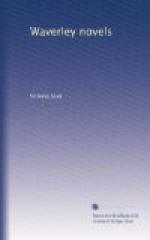‘Woe, woe, for Scotland, not a whit for me!’
The laird was only rejoiced that his worthy friend, Sir Everard Waverley of Waverley-Honour, was reimbursed of the expenditure which he had outlaid on account of the house of Bradwardine. It concerned, he said, the credit of his own family, and of the kingdom of Scotland at large, that these disbursements should be repaid forthwith, and, if delayed, it would be a matter of national reproach. Sir Everard, accustomed to treat much larger sums with indifference, received the remittance of L294, 13S. 6D. without being aware that the payment was an international concern, and, indeed, would probably have forgot the circumstance altogether, if Bailie Macwheeble had thought of comforting his cholic by intercepting the subsidy. A yearly intercourse took place, of a short letter and a hamper or a cask or two, between Waverley-Honour and Tully-Veolan, the English exports consisting of mighty cheeses and mightier ale, pheasants, and venison, and the Scottish returns being vested in grouse, white hares, pickled salmon, and usquebaugh; all which were meant, sent, and received as pledges of constant friendship and amity between two important houses. It followed as a matter of course, that the heir-apparent of Waverley-Honour could not with propriety visit Scotland without being furnished with credentials to the Baron of Bradwardine.
When this matter was explained and settled, Mr. Pembroke expressed his wish to take a private and particular leave of his dear pupil. The good man’s ex hortations to Edward to preserve an unblemished life and morals, to hold fast the principles of the Christian religion, and to eschew the profane company of scoffers and latitudinarians, too much abounding in the army, were not unmingled with his political prejudices. It had pleased Heaven, he said, to place Scotland (doubtless for the sins of their ancestors in 1642) in a more deplorable state of darkness than even this unhappy kingdom of England. Here, at least, although the candlestick of the Church of England had been in some degree removed from its place, it yet afforded a glimmering light; there was a hierarchy,




